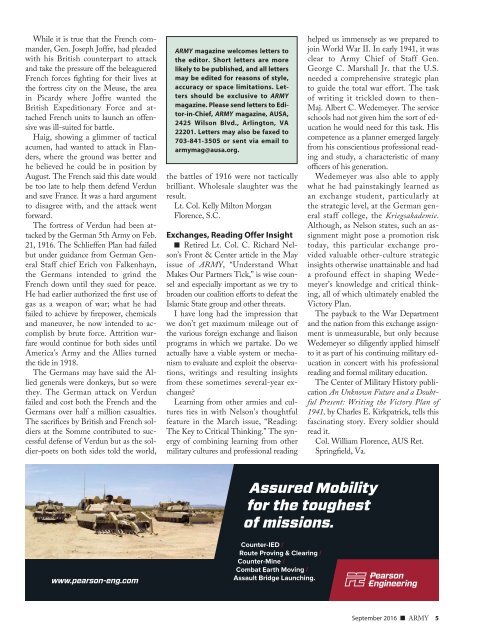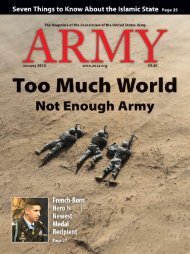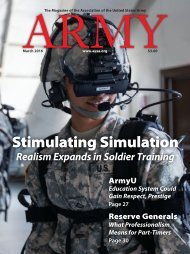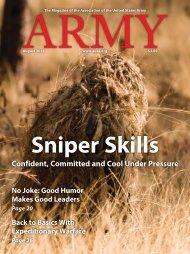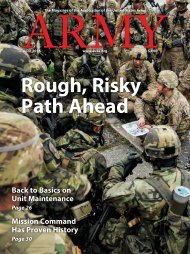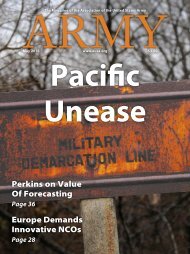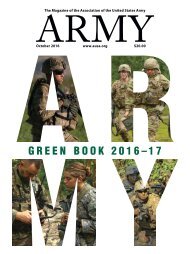Army - The New Germ War
You also want an ePaper? Increase the reach of your titles
YUMPU automatically turns print PDFs into web optimized ePapers that Google loves.
While it is true that the French commander,<br />
Gen. Joseph Joffre, had pleaded<br />
with his British counterpart to attack<br />
and take the pressure off the beleaguered<br />
French forces fighting for their lives at<br />
the fortress city on the Meuse, the area<br />
in Picardy where Joffre wanted the<br />
British Expeditionary Force and attached<br />
French units to launch an offensive<br />
was ill-suited for battle.<br />
Haig, showing a glimmer of tactical<br />
acumen, had wanted to attack in Flanders,<br />
where the ground was better and<br />
he believed he could be in position by<br />
August. <strong>The</strong> French said this date would<br />
be too late to help them defend Verdun<br />
and save France. It was a hard argument<br />
to disagree with, and the attack went<br />
forward.<br />
<strong>The</strong> fortress of Verdun had been attacked<br />
by the <strong>Germ</strong>an 5th <strong>Army</strong> on Feb.<br />
21, 1916. <strong>The</strong> Schlieffen Plan had failed<br />
but under guidance from <strong>Germ</strong>an General<br />
Staff chief Erich von Falkenhayn,<br />
the <strong>Germ</strong>ans intended to grind the<br />
French down until they sued for peace.<br />
He had earlier authorized the first use of<br />
gas as a weapon of war; what he had<br />
failed to achieve by firepower, chemicals<br />
and maneuver, he now intended to accomplish<br />
by brute force. Attrition warfare<br />
would continue for both sides until<br />
America’s <strong>Army</strong> and the Allies turned<br />
the tide in 1918.<br />
<strong>The</strong> <strong>Germ</strong>ans may have said the Allied<br />
generals were donkeys, but so were<br />
they. <strong>The</strong> <strong>Germ</strong>an attack on Verdun<br />
failed and cost both the French and the<br />
<strong>Germ</strong>ans over half a million casualties.<br />
<strong>The</strong> sacrifices by British and French soldiers<br />
at the Somme contributed to successful<br />
defense of Verdun but as the soldier-poets<br />
on both sides told the world,<br />
ARMY magazine welcomes letters to<br />
the editor. Short letters are more<br />
likely to be published, and all letters<br />
may be edited for reasons of style,<br />
accuracy or space limitations. Letters<br />
should be exclusive to ARMY<br />
magazine. Please send letters to Editor-in-Chief,<br />
ARMY magazine, AUSA,<br />
2425 Wilson Blvd., Arlington, VA<br />
22201. Letters may also be faxed to<br />
703-841-3505 or sent via email to<br />
armymag@ausa.org.<br />
the battles of 1916 were not tactically<br />
brilliant. Wholesale slaughter was the<br />
result.<br />
Lt. Col. Kelly Milton Morgan<br />
Florence, S.C.<br />
Exchanges, Reading Offer Insight<br />
■ Retired Lt. Col. C. Richard Nelson’s<br />
Front & Center article in the May<br />
issue of ARMY, “Understand What<br />
Makes Our Partners Tick,” is wise counsel<br />
and especially important as we try to<br />
broaden our coalition efforts to defeat the<br />
Islamic State group and other threats.<br />
I have long had the impression that<br />
we don’t get maximum mileage out of<br />
the various foreign exchange and liaison<br />
programs in which we partake. Do we<br />
actually have a viable system or mechanism<br />
to evaluate and exploit the observations,<br />
writings and resulting insights<br />
from these sometimes several-year exchanges?<br />
Learning from other armies and cultures<br />
ties in with Nelson’s thoughtful<br />
feature in the March issue, “Reading:<br />
<strong>The</strong> Key to Critical Thinking.” <strong>The</strong> synergy<br />
of combining learning from other<br />
military cultures and professional reading<br />
helped us immensely as we prepared to<br />
join World <strong>War</strong> II. In early 1941, it was<br />
clear to <strong>Army</strong> Chief of Staff Gen.<br />
George C. Marshall Jr. that the U.S.<br />
needed a comprehensive strategic plan<br />
to guide the total war effort. <strong>The</strong> task<br />
of writing it trickled down to then-<br />
Maj. Albert C. Wedemeyer. <strong>The</strong> service<br />
schools had not given him the sort of education<br />
he would need for this task. His<br />
competence as a planner emerged largely<br />
from his conscientious professional reading<br />
and study, a characteristic of many<br />
officers of his generation.<br />
Wedemeyer was also able to apply<br />
what he had painstakingly learned as<br />
an exchange student, particularly at<br />
the strategic level, at the <strong>Germ</strong>an general<br />
staff college, the Kriegsakademie.<br />
Although, as Nelson states, such an assignment<br />
might pose a promotion risk<br />
today, this particular exchange provided<br />
valuable other-culture strategic<br />
insights otherwise unattainable and had<br />
a profound effect in shaping Wedemeyer’s<br />
knowledge and critical thinking,<br />
all of which ultimately enabled the<br />
Victory Plan.<br />
<strong>The</strong> payback to the <strong>War</strong> Department<br />
and the nation from this exchange assignment<br />
is unmeasurable, but only because<br />
Wedemeyer so diligently applied himself<br />
to it as part of his continuing military education<br />
in concert with his professional<br />
reading and formal military education.<br />
<strong>The</strong> Center of Military History publication<br />
An Unknown Future and a Doubtful<br />
Present: Writing the Victory Plan of<br />
1941, by Charles E. Kirkpatrick, tells this<br />
fascinating story. Every soldier should<br />
read it.<br />
Col. William Florence, AUS Ret.<br />
Springfield, Va.<br />
September 2016 ■ ARMY 5


